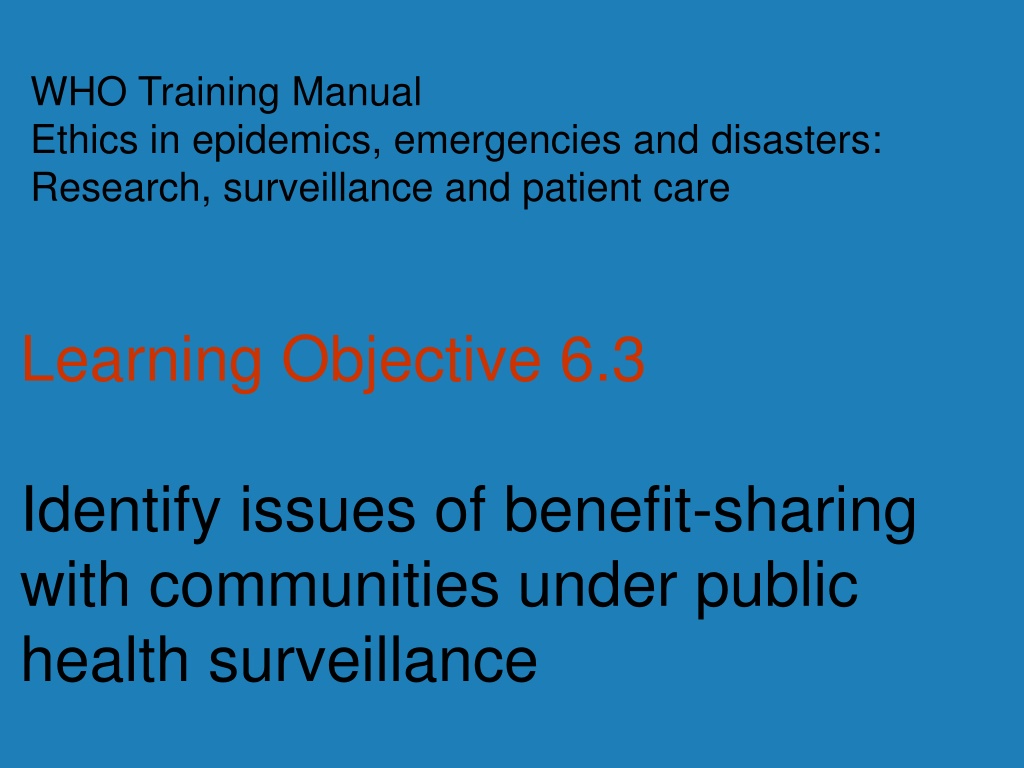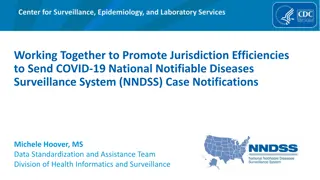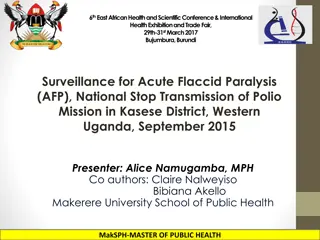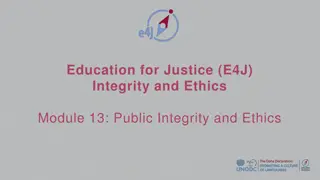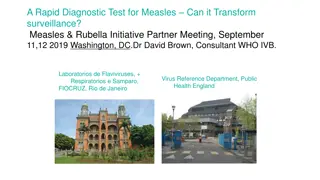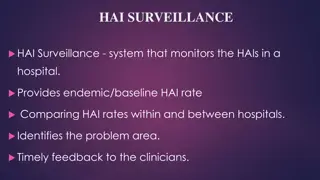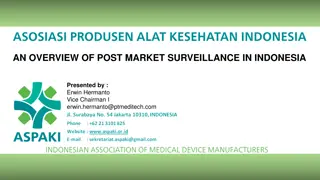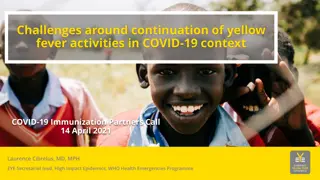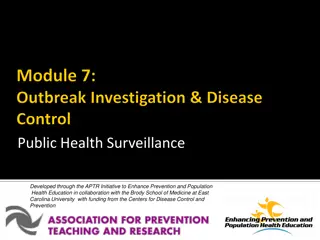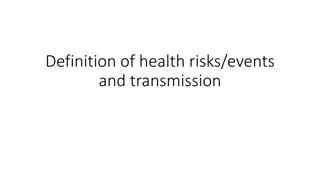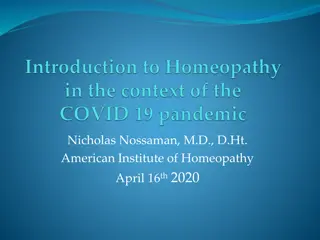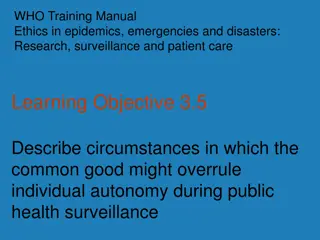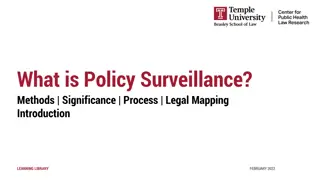Ethics in Epidemics: Benefit Sharing in Public Health Surveillance
Benefit sharing in public health surveillance involves distributing advantages or profits derived from resources equitably to ensure justice and prevent exploitation. The concept, originating in the 1970s, emphasizes fair provision of benefits to resource providers, especially those lacking access to resulting healthcare products. Ethical justifications include beneficence, solidarity, and recognition of common heritage. International efforts focus on sharing benefits of health research with participants and broader humanity.
Download Presentation

Please find below an Image/Link to download the presentation.
The content on the website is provided AS IS for your information and personal use only. It may not be sold, licensed, or shared on other websites without obtaining consent from the author. Download presentation by click this link. If you encounter any issues during the download, it is possible that the publisher has removed the file from their server.
E N D
Presentation Transcript
WHO Training Manual Ethics in epidemics, emergencies and disasters: Research, surveillance and patient care Learning Objective 6.3 Identify issues of benefit-sharing with communities under public health surveillance
Outline 1. Introduction - benefit sharing and its evolution 2. Individual reflection and discussion 3. Reading and group exercise 4. Case study and discussion - Indonesia 5. Summary Suggest ed time 0-20 (20 min) 21-35 (15 min) 36-40 (5 min) 41-55 (15 min) 56-65 (10 min) 66-70 (5 min) 71-100 (30 min) 101-105 (5 min) Activity Class discussio n Case presentation Introducti on Individual reflection Reading article Group discussio n Case discussion Summary and conclusion L.O. 6.3
Benefit sharing Concept develops in 1970s in response to notion of common heritage of humankind, but only recently a research ethics topic A debated concept with various definitions Some resources are so broadly distributed that it is inappropriate for them to be be monopolized by any individual, organization or state Gaps in power and wealth led to concerns encouraging exploitation L.O. 6.3
Benefit sharing A possible definition: Benefit sharing is the action of giving a portion of advantages/profits derived from the use of human genetic resources to the resource providers to achieve justice in exchange, with a particular emphasis on the clear provision of benefits to those who may lack reasonable access to resulting healthcare products and services without providing unethical inducements. Schroeder D. Benefit sharing: It s time for a definition. Journal of Medical Ethics 2007; 33(4): 205-209. L.O. 6.3
Benefit sharing Idea of common heritage needs to be coupled explicitly with obligation to share equitably these common resources Growing trend to internationalisation of research greater attention to how benefits of health research should be shared With research participants With humanity more generally L.O. 6.3
Ethical justification for benefit sharing Property rights Initially done in plant and animal genetics But ownership not generally applicable in clinical research Beneficence In clinical research participants take risks in allowing experimental interventions to be tested on them Since they are taking the risks some suggest they should reap some of the rewards Declaration of Helsinki participants in clinical trials should be provided beneficial interventions after trial ends Solidarity with fellow humans and global justice Research should benefit those with greatest needs, even if costs must be borne by those who are more affluent L.O. 6.3
Individual Reflection Universal Declaration on Bioethics and Human Rights (UNESCO 2005) Article 15 states that: Benefits resulting from any scientific research and its applications should be shared with society as a whole and within the international community, in particular with developing countries. Where do you think public health surveillance should draw a line between appropriate benefits and inappropriate inducement for participation? L.O. 6.3
Reading and discussion Simm K. Benefit sharing: A look at the history of an ethics concern. Nature Reviews Genetics 2007; 8; 496. In groups of 3 or 4: How would you apply the various notions of benefit sharing in Simm (2007) to public health surveillance? L.O. 6.3
Justifying benefit sharing In plant and animal genetics: benefit sharing on the ground of property rights In clinical research: taking risks warrants gaining benefits In global justice: those with the most need should receive the most benefit Question: What about justifying benefit sharing in public health surveillance? Reference: Simm K. Benefit sharing: A look at the history of an ethics concern. Nature Reviews Genetics 2007; 8; 496. L.O. 6.3
Case Study Indonesia Indonesia reported the highest number of human cases of influenza A (H5N1) in the world between 2005 and 2007. Of these 116 cases, 81 percent were fatal. Viral outbreaks in poultry have been reported in 31 of Indonesia s 33 provinces (Sedyaningsih et al. 2008). Eighty percent of Indonesia s poultry are kept in small backyards, with the remaining being raised in industrial poultry facilities. Such poultry cannot be exported under a World Trade Organization agreement due to the presence of a highly pathogenic infection in the national flock. L.O. 6.3
Case Study Indonesia In 2007, Indonesia announced that it would no longer send avian flu samples to WHO Collaborating Centres (Fidler 2010). The argument was made by a number of countries that poorer nations were contributing virus to the development of pandemic vaccines without reaping any benefits because the resulting vaccines were unavailable or unaffordable. It was alleged that higher-income countries were profiteering from such arrangements, and using the donated virus to develop biological weapons (Holbrooke & Garrett 2008). L.O. 6.3
Case Study Indonesia Although an argument was made that the virus belonged to the common heritage of humankind and should be shared with the rest of humanity for their good, Indonesia s then Minister of Health, Dr. Siti Fadilah Supari used the idea of viral sovereignty to support her argument (Holbrooke & Garrett 2008). The Convention on Biological Diversity supports the rights of countries to ownership and patents of indigenous plants and botanicals. Dr. Supari claimed that viruses fall under this Convention, and that the IHR requires sharing of knowledge and facts, not biological samples. Others claim that viruses are distinct from other biological resources as they naturally spread beyond national boundaries. Also, the potential risk of harm from a global pandemic overrides any notion of viral sovereignty. L.O. 6.3
Case Study Indonesia When it was suggested that Indonesia had an obligation to the rest of humanity, Indonesian officials pointed to an obligation on the part of the global community towards the people of Indonesia since the country would likely be severely impacted by any pandemic. L.O. 6.3
Case study discussion Using the language of ethics: a) How would you justify Dr Supar s position that Indonesia should withhold providing avian flu samples? b) How would you justify the position that a country has an obligation to participate fully in global viral surveillance, including sharing viral samples? c) How would you justify the position that vaccine manufacturers have an obligation to share the benefits of their products with those who contributed to their development? How do you think the positions in b) and c) can be ethically balanced? L.O. 6.3
Summary Benefit sharing is an evolving principle within research ethics. In general, benefit sharing can be described as the return of a portion of the benefits derived from the use of resources to those who made access to the resource possible, but who otherwise lack reasonable access to the products and services that result from such use. However, there remains considerable controversy over precisely what benefits should be shared. L.O. 6.3
Sources Fidler D (2010) Negotiating equitable access to influenza vaccines: global health diplomacy and controversies surrounding avian influenza H5N1 and pandemic influenza H1N1. PloS Med 7(5):e1000247 Holbrooke P, Garrett L (2008) Sovereignty that risks global health. Washington Post, 10 August 2008 (http://articles.washingtonpost.com/2008- 08-10/opinions/36864341-1). Schroeder D (2007) Benefit sharing: It s time for a definition. J Med Eth 33(4):205 9. Simm K (2007) Benefit sharing: a look at the history of an ethics concern. Nature Rev Genet 8:496. Sedyaningsih ER, Isfandari S, Soendoro T, Supari SF (2008) Towards mutual trust, transparency and equity in virus sharing mechanism: the avian influenza case of Indonesia. An Acad Med Singapore 37:482 8. UNESCO (2005) Universal Declaration on Bioethics &Human Rights. Paris (http://www.unesco.org/new/en/social-and-human-sciences/themes/bioethics/ bioethics-and-human-rights/). L.O. 6.3
Acknowledgements Chapter author O Math na, D nal, School of Nursing and Human Sciences, Dublin City University, Dublin, Ireland L.O. 6.3
